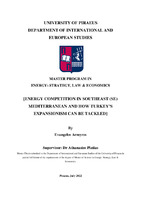Energy competition in the Southeast (SE) Mediterranean and how Turkey's expansionism can be tackled
Ενεργειακός ανταγωνισμός στη Νοτιοανατολική Μεσόγειο και πως μπορεί να αντιμετωπιστεί η επεκτατικότητα της Τουρκίας

Master Thesis
Author
Armyros, Evangelos
Αρμύρος, Ευάγγελος
Date
2022-07Keywords
Energy competition ; South-Eastern Mediterranean ; Trade crossroads ; Energy hub ; Energy interdiction zone ; Energy crisis ; Energy reserves ; EEZ ; «Blue Homeland» Doctrine ; Turkish-Libyan Memorandum ; Instrumentalization of migration ; ExpansionismAbstract
The Southeastern Mediterranean is an extremely interesting region in every respect. In the current period, it is the field of a multidimensional competition of many actors, both local and international.
The discovery of huge quantities of hydrocarbons in its subsoil creates great prospects for ensuring energy security for the region and, under certain conditions, for the whole of Europe, contributing significantly to its energy independence from Russia. This is particularly important in the current period, especially after the Ukrainian-Russian crisis and Russia's blackmailing attitude regarding the supply of natural gas to Europe to obtain milder sanctions.
In addition, these huge quantities of hydrocarbons have created a new field of competition and confrontation in the region between local actors and powerful international players. This competition extends to both the energy and geopolitical spheres. The former are trying to acquire as much of the energy 'pie' as possible and to emerge as regional powers in the region, while the latter is trying to increase their sphere of influence by creating partnerships and alliances in the region, serving, behind the scenes in most cases, the interests of the former.
The confrontation between Greece and Turkey is part of this energy and geopolitical competition. Both countries are seeking to gain the title of regional power in the wider Balkan Peninsula and the South-Eastern Mediterranean region. This effort puts them in a position of confrontation, sometimes with intense characteristics, to such an extent that they are not even close to armed conflict. However, local hot incidents and crises are created, which activate their military forces.
The purpose of this thesis is to analyze:
a. The energy competition, mainly but also the geopolitical competition, to a lesser extent, in the Eastern Mediterranean region between the states of the region and the strong powers (USA, Russia, China).
b. Turkey's stance in the wider SE Mediterranean region, its claims, and how these affect its relationship with Greece.
c. The ways Greece deals with Turkey's expansionism in the region.


